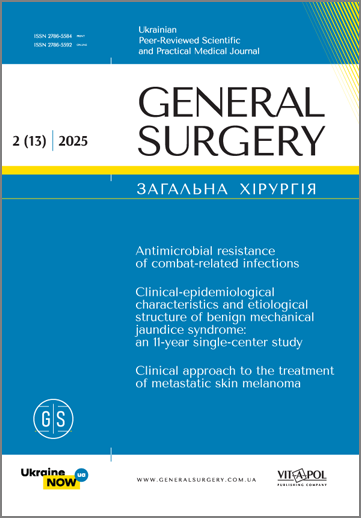Multifactorial assessment of the effectiveness of surgical treatment for obesity
DOI:
https://doi.org/10.30978/GS-2025-2-50Keywords:
treatment, polymorphisms, obesity, bariatric surgeryAbstract
Objective – to create a model for choosing the most effective method of surgical treatment of obesity.
Materials and methods. The study was conducted at the Department of General Surgery No 2, Bogomolets National Medical University. The study group included 53 patients who consented to the bariatric procedure. The control group consisted of 59 patients. The study group underwent bariatric interventions: laparoscopic gastric bypass (37.7%), laparoscopic sleeve gastrectomy (32.2%), and 30.1% underwent the installation of an intragastric balloon, followed by gastric bypass and outcome assessment after 12 months. The control group received conservative treatment for obesity. All patients underwent routine general clinical examinations, genotyping via the Fast Real‑Time PCR System in TaqMan medium, and stool analysis using polymerase chain reaction to determine the parameters of the intestinal microbiome.
Results. Statistical data processing showed that the chance of achieving an optimal outcome is highest in patients with a detected SNP MC4R, an unsatisfactory initial intestinal microbiota pattern, and an extensive family history of obesity, as well as those who underwent laparoscopic gastric bypass.
Conclusions. Laparoscopic gastric bypass is the preferred surgical technique for obesity treatment, yielding an optimal outcome. The presence of an unsatisfactory initial intestinal microbiota pattern, the detection of SNP MC4R polymorphism, and a family history of obesity influence the effectiveness of surgical treatment. The chance of achieving an optimal outcome is 3.6 times higher in patients with a detected SNP MC4R polymorphism.
References
Ioffe OY, Molnar IM, Tsyura YP, ta in. Vybir optymalnih strokiv vykonannya bariatrichnych operatsiy pislya vydalennya vnutrishnyoshlunkovogo balonu. Actualni problemy suchasnoyi medytsyny. Visn Ukr med stomatol akad. 2017;17(3):115-8. Ukrainian.
Al-Humadi AW, Mullaney J, Fernandez J, et al. Obesity characteristics are poor predictors of genetic mutations associated with obesity. J Clin Med. 2023;12(19):6396. http://doi.org/10.3390/jcm12196396.
Bandstein M, Henriksson H, Rask-Andersen M, et al. A genetic risk score is associated with weight loss following Roux-en Y gastric bypass surgery. Obes Surg. 2016;26:2183-9. http://doi.org/10.1007/s11695-016-2072-9.
Bouchard C. Genetics of obesity: what we have learned over decades of research. Obesity (Silver Spring). 2021;29(5):802-20. http://doi.org/10.1002/oby.23116.
Coulman KD, Chalmers K, Blazeby J, et al. Development of a Bariatric Surgery Core Data Set for an International Registry. Obes Surg. 2023;33(5):1463-75. http://doi.org/10.1007/s11695-023-06545-y.
Gentile CL, Weir TL. The gut microbiota at the intersection of diet and human health. Science. 2018;362(6416):776-80. http://doi.org/10.1126/science.aau5812.
Gomes AC, Hoffmann C, Mota JF. The human gut microbiota: metabolism and perspective in obesity. Gut Microbes. 2018;9(4):308-25. http://doi.org/10.1080/19490976.2018.1465157.
Gutiérrez-Repiso C, Moreno-Indias I, Tinahones FJ. Shifts in gut microbiota and their metabolites induced by bariatric surgery. Impact of factors shaping gut microbiota on bariatric surgery outcomes. Rev Endocr Metab Disord. 2021;22:1137-56. http://doi.org/10.1007/s11154-021-09676-8.
Lee CJ, Sears CL, Maruthur N. Gut microbiome and its role in obesity and insulin resistance. Ann N Y Acad Sci. 2020;1461(1):37-52. http://doi.org/10.1111/nyas.14107.
Loos RJF, Yeo GSH. The genetics of obesity: from discovery to biology. Nat Rev Genet. 2022;23(2):120-33. http://doi.org/10.1038/s41576-021-00414-z.
Lutz SZ, Schuchardt M, Jähnert M, Rödiger M, Dörr M, Krohn K, et al. Single nucleotide polymorphisms in the G-protein coupled receptor kinase 5 (GRK5) gene are associated with plasma LDL-cholesterol levels in humans. Sci Rep. 2018 May 17;8(1):7745. http://doi.org/10.1038/s41598-018-26055-7.
Palmisano S, Campisciano G, Silvestri M, et al. Changes in gut microbiota composition after bariatric surgery: a new balance to decode. J Gastrointest Surg. 2020;24(8):1736-46. http://doi.org/10.1007/s11605-019-04321-x.
Xu G, Song M. Recent advances in the mechanisms underlying the beneficial effects of bariatric and metabolic surgery. Surg Obes Relat Dis. 2021;17(1):231-8. http://doi.org/10.1016/j.soard.2020.08.028.
Zsálig D, Papp R, Madácsy T, et al. A review of the relationship between gut microbiome and obesity. Appl Sci. 2023;13(1):610. http://doi.org/10.3390/app13010610.
Zhao J, Li M, Bradfield JP, Wang K, Zhang H, Kim CE, et al. Examination of type 2 diabetes loci implicates CDKAL1 as a birth weight gene. Diabetes. 2009 Oct;58(10):2414-8. http://doi.org/10.2337/db09-0506.
Downloads
Published
How to Cite
Issue
Section
License
Copyright (c) 2025 Authors

This work is licensed under a Creative Commons Attribution-NoDerivatives 4.0 International License.






